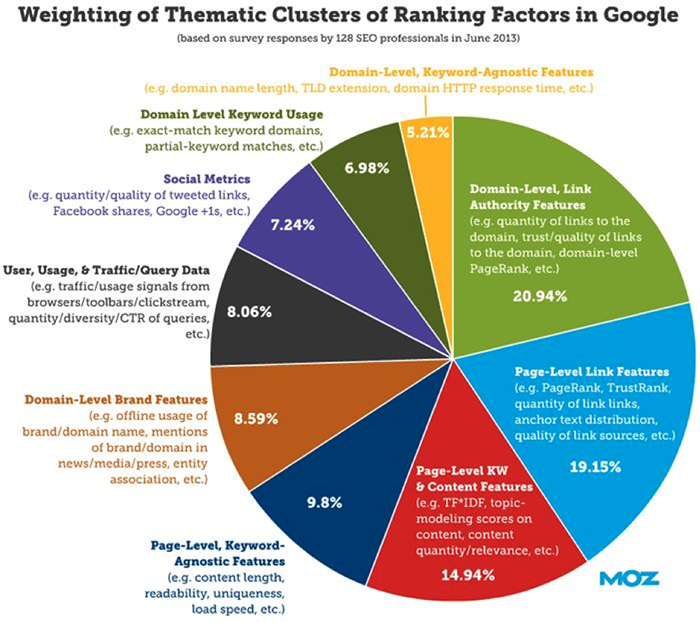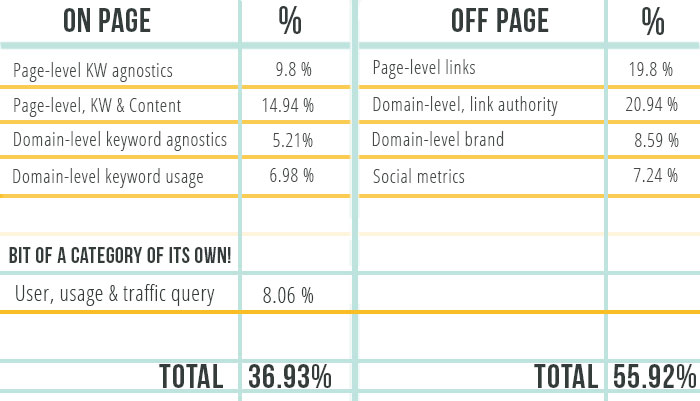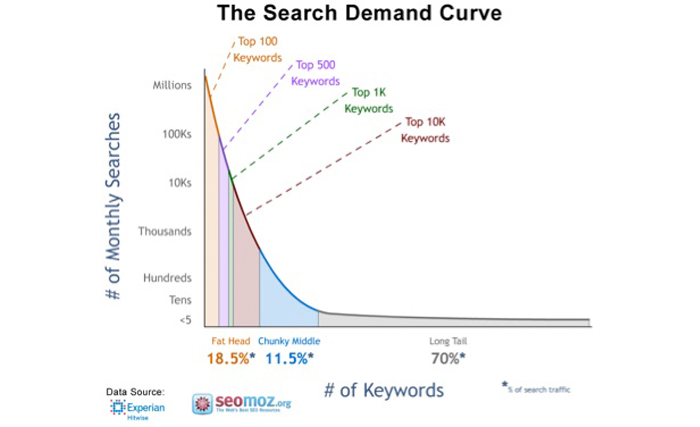The rule of three in search engine optimisation
Selling search secrets or selling you short?
Did you know that Google has at least 200 ranking factors that power its search algorithms and determine where your website sits on the results pages?
Yes, that’s right two hundred things that contribute to whether or not you appear in the 5,922,000,000 search results it serves up every single day.
Well, you could just about rule the world if you got your hands on a list like that. It’s like a digital philosopher’s stone or a modern-day holy grail, right?
Well... not really.
Sorry to disappoint but the information about Google’s list of ranking factors is pretty freely available, and its actually more a damp squib than a blinding revelation. It’s great for after-dinner games (how many can you name?), but it’s of only marginal use for serious SEO.
A list of two hundred factors is of questionable value. It’s more likely to overwhelm than empower. It somewhat misses the point. It’s better to understand how to apply the things that matter than it is to know all the incidentals and marginalia.
What such a list won’t tell you is:
- How often the algorithm changes
- How the various factors interact with each other
- The weight that Google assigns to each factor.
It teaches you everything except what you really want to know.
You don’t want to just understand SEO. You want to use it to improve your search visibility.
Fear not: we’ll not burden you with 200 ways you can infinitesimally tweak your site’s optimisation. Instead we’ll show you how three factors have come to dominate search.
It is the rule of three. Just three things. Three very crucial things.
Together they form an almost imperial triumvirate that controls the rankings your site will receive. These are the areas that can make or break your SEO efforts. These are your tools to change your fortunes.
What are they?
Read on to find out how you can stop interpreting SEO and start to change your website’s search positions.
The rule of three
Good things come in threes: the Holy Trinity, for instance. And the three muses. Not to mention the three Stooges, musketeers and little pigs.
Three is a magic number.
- In economics the rule of three predicts that, in any sector of a free market, there will be three main competitors.
- In aviation the rule of three helps planes land safely.
- In writing the rule of three makes for memorable phrases my friends, Romans and countrymen.
So it should come as no surprise that in the world of search three factors have come to dominate. After all, who has heard of a rule of 200?
On page and off page SEO
There’s more than one way to skin a cat, and there’s certainly more than one way to divide up the 200 search ranking factors into meaningful groups.
For our purposes we’d just like to look at them from the perspective of whether they are applied to your website pages, or if they occur due to your site’s relationship to others.
That is to say if they are affected by on or off page SEO.
Not so long ago the great and the good of the SEO community were brought together by SEOMoz to try and provide some insight into how different ranking factors are weighted by Google. In doing so they produced something of far greater value than an exhaustive list: they produced something you could work with rather than stress over.
Of course, it’s an opinion. Google maintains an understandable stately silence over its algorithms. It is, however, the opinion from those most likely to know. It may not be from the horse’s mouth but it’s not half-assed either.
Here’s what they found.

http://moz.com/blog/weighting-the-clusters-of-ranking-factors-in-google-analytics-whiteboard-friday
What does it show?
Let’s split it into what happens on and off page.

It may surprise you to learn that all the work you have put into your site itself is actually worth considerably less than what happens beyond it.
- Links from other sites are the single biggest factor accounting for nearly 40%.
- Things like brand mentions and citations have grown in perceived importance to nearly 10%.
- Social media holds a growing, but still small, percentage—we’ll come back to this.
Now that is useful to know. But what does it mean for you: what should you be doing to rise up the rankings?
It’s time to unveil the big three.
Three things that can transform your search rankings
Search engine optimisation is the ability to stand out from the crowd. How can you do this? Well, for a start you can stop worrying about all those ranking factors and choose to focus on the three things that will make a real difference.
They are:
- Crafting compelling content
- Leveraging lots of links
- Sending out strong social signals.
The beauty of it all is that each of these activities complements and supports the development of the rest. What’s more, each factor can help attract and convert the visitors in the stalls as well as playing to the Google gods.
Content beyond the page
It’s not that on-page optimisation is no longer important.
Don’t forget it still accounts for about 40% of the Google weighting. Things like keyword research, keyword deployment, meta tags, site structure, internal links, your site name and the ways your urls are named are still important. Not as important as they may once have been, but important nonetheless.
It’s just that they provide the essential groundwork for your site’s development, rather than offering a house you can settle down and retire in. To help your site really rise you’re going to need some quality content, and lots of it, regularly added to your site.
Deep content
Google’s goal is, and always has been, to ensure that the search results it returns are the best ones for each search query. It wants to return the results that are the most authoritative, the ones that best fulfil the request.
Google makes no secret about its goals. It outlines its philosophy as “Ten things we know to be true”, and the first thing is:
“Since the beginning, we’ve focused on providing the best user experience possible.”
Google
Every update to its algorithm that is rolled out aims to make it harder to cheat the system. The aim is to ensure that only sites which deliver exactly what users want will get served up in its results pages.
So how can you be such an authority site?
- You must be good at what you do. In fact, you must be the best.
- You must be recognised as such by others.
- You must offer content that covers all the bases.
- You must have a site that delivers all the answers.
There isn’t a shortcut to success, but there also aren’t any secrets to achieving it. You need to provide plenty of quality content. Deep content.
And what is deep content?
- It is more weighty than just a 300-500 word blog post.
- It goes beyond scratching the surface to offer meaningful insight.
- It explores every possible area of your core business focus.
- It does so in a way that adds value, rather than offers more of the same.
The effects of deep content are pretty profound. Here’s what they can dig up for you:
- Attract 70% more visitors by greatly increasing your chances of ranking for long-tail searches.
- Convert visitors by helping them find just what they want.
- Convince visitors that you are a trustworthy authority.
- Strengthen your site’s authority with Google through the amount of relevant, quality, linked content it has indexed.
- Attract links from other sites who are impressed by your content.
Pretty powerful stuff, indeed.

Importantly content attracts links and links give your site the power to rise up the ranks. The effects of content go beyond the page and into the heart of your SEO strategy.
Content marketing
“Content is king, but marketing is queen, and runs the household.”
Gary Vaynerchuk
Adding content adds value to your site. Let’s add some more: start marketing your content and you have lit the fuse paper. Stand back and watch the fireworks begin.
According to the latest estimates Google has indexed more than 5 trillion pages on the World Wide Web. Even with its obsessive compiling tendencies the search engine would be the first to admit that there still exist many more out there.
Having told you to publish pages we now have to break the bad news. Each one is just a drop in a very big ocean. It is just a voice crying out in the wilderness.
Marketing your content amplifies your voice. It makes your first small ripples begin to spread until they become significant waves.
- Start content showcasing
Make sure each new piece of content is easily accessed and signposted on your site. - Start people talking
Shout about your content using social media and email. - Start strategic linking
Try and get influential sites aware of and referencing your content.
It’s these influential sites and links we turn to next.
Link building
“The objective is not to ‘make your links appear natural’; the objective is that your links are natural.” Matt Cutts, Google
The days of link farms and paid links are over. Indeed it looks like we are reaching the end of a long night for sites that rely excessively on links from directories and guest posting.
Links still remain critically important, as we have already seen. It’s just that, in its quest for an ‘accurate’ result page that serves up what users really want, Google is looking to reward only links that have been ‘freely’ given.
For Google links are indicators that another site finds material on your webpage valuable and relevant.
- The more links your page gets, the more valuable your content is deemed to be.
- The higher the authority of a site that links to you, the more weight this link is given.
- The more links your site has, the higher its authority is viewed by the search engine.
- The more authority the better it ranks.
- The higher it ranks the more visitors you get.

Linked content
Here’s where it all begins to link in: a great way to attract links is through content marketing. Great content gets shared through links. Take this free guide to SEO. It is detailed, trustworthy and probably could sell for £10 or more. But it’s of inestimable optimisation value. To date it has had:
- Over 1 million downloads
- 2,000 unique domain links (2,001 now!)
- 1,168 Tweets
- 2,900 Likes
- 1,500 +1's
Adding value for visitors adds links for you. Authoritative content confers authority. You scratch the users back and other users will come to scratch around.
Getting linked in
Of course links are not all about content marketing. Here are some more ways to get them.
- Press releases
- Speaking at a conference
- Sponsoring an event
- Asking for them – check out this great little video on finding the opportunities
- Professional body memberships
- Awards
- Quality, human-edited, relevant directories
Engaging social media
We’ve played it pretty safe for our first two SEO factors. Everyone knows that content is king, right? And only a fool would ignore links.
Announcing social as the third string to an ideal SEO bow will, no doubt, hit something of a bum note for many.
Think back to the gut-feelings of industry experts trying to guess what the most important ranking factors are for Google. Far from appearing in the top 3 social languished at third from last.
So why include it here?
Commenting on the findings, Rand Fishkin suggests that the SEO community just can’t really understand how social fits in. They don’t see the big picture, or at least they are not prepared to put their names to something they can’t yet pin down. Yet, study after study highlights the very strong correlates that exist between a strong social presence and a good position on the all-important results pages.
Time will tell, but here are our reasons for engaging social as an essential part of your SEO strategy.
How social complements SEO
Some analysts predicted that social media activity would replace SEO. We think it complements and augments it.
- Social spreads the word about brand—an increasingly important SEO factor as we have seen.
- Social helps you promote content—and indirectly it helps attract links.
- Social helps you find influencers—who can further broadcast your content.
- Social creates a space for others to amplify your message—including share and like buttons makes it easy for others to pass on the good news they find on your site.
- Social (Google +) creates online authors—whose authority can grow and influence the ‘value’ of everything else they write.
- Google +1’s directly influence personalised search results—although the jury is still out on their universal impact.
Social is a great way to market content. Social is a great way to build brand awareness and mentions. Social is a great way to get links.
Do the maths
“Good SEO work only gets better over time. It’s only search engine tricks that need to keep changing when the ranking algorithms change.”
Jill Whalen
To sum it all up:
 Content + Social + Links = Rankings
Content + Social + Links = Rankings
No tricks. Nothing up the sleeves. No black hat.
Just the rule of three.



